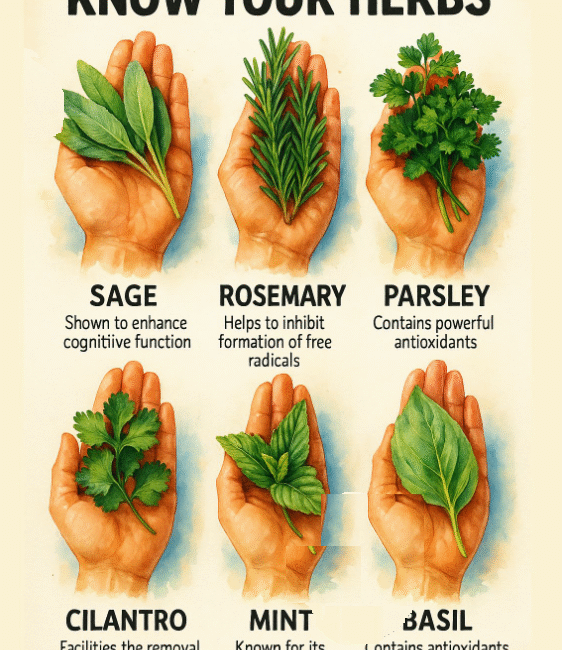For centuries, herbs have been valued not just for their culinary uses, but for their profound healing and beautifying effects on the human body. Long before modern medicine and cosmetics, civilizations around the world harnessed the therapeutic power of herbs for mental clarity, radiant skin, digestive support, immune defense, and detoxification.
Today, scientific research is catching up to traditional wisdom, confirming that many herbs contain antioxidants, anti-inflammatory compounds, and natural phytochemicals that promote optimal health and youthful vitality.
In this comprehensive guide, we explore 10 exceptional herbs known for their remarkable benefits for both health and beauty—with in-depth insights into their uses, active compounds, and practical ways to include them in your daily life.
1. 🌿 Sage (Salvia officinalis)
Key Benefit: Enhances cognitive function and memory retention
Health Benefits:
Sage has a long-standing reputation in herbal medicine as a brain-boosting tonic. Modern studies show that sage contains compounds like rosmarinic acid and carnosic acid, which support neuroprotective activity and help reduce oxidative stress in the brain. Sage has been studied for its potential to improve memory, attention, and alertness, particularly in older adults or individuals at risk for cognitive decline.
- Anti-inflammatory and antimicrobial, sage supports oral health and throat infections.
- Its estrogen-like effects may help relieve menopausal symptoms such as hot flashes and mood swings.
Beauty Benefits:
Sage’s antibacterial and astringent properties make it beneficial in skincare routines—especially for oily or acne-prone skin. Used in facial steams or infused oils, sage can help tighten pores, reduce acne, and control excess sebum production.
How to Use:
- Drink as a tea for cognitive clarity
- Use sage essential oil diluted for scalp or skin treatments
- Add fresh or dried leaves to stews and herbal butters
2. 🌿 Rosemary (Rosmarinus officinalis)
Key Benefit: Inhibits free radical formation; supports memory and circulation
Health Benefits:
Rosemary is rich in antioxidants like rosmarinic acid and carnosol, which combat free radicals—unstable molecules that contribute to aging and chronic diseases. Studies suggest rosemary may enhance memory, boost mood, and improve circulation, making it a favorite in both aromatherapy and nutritional applications.
- Anti-inflammatory effects benefit the heart and immune system.
- May help lower blood sugar and improve digestion.
Beauty Benefits:
Rosemary is widely used in hair care products due to its ability to stimulate hair follicles, promote growth, and reduce dandruff. It improves scalp circulation and fights bacterial buildup.
How to Use:
- Drink rosemary tea to aid memory
- Rinse hair with rosemary-infused water
- Inhale rosemary essential oil for mental clarity
3. 🌿 Parsley (Petroselinum crispum)
Key Benefit: A potent source of antioxidants, vitamins, and detoxifying compounds
Health Benefits:
Parsley is often underestimated, but this leafy green is a nutritional powerhouse. It’s high in vitamins A, C, and K, as well as apigenin, a compound with anti-cancer, anti-inflammatory, and immune-supporting properties.
- Parsley promotes kidney health and detoxification by acting as a natural diuretic.
- Contains flavonoids and myristicin, which protect against oxidative stress.
Beauty Benefits:
Parsley promotes clear skin and a healthy complexion thanks to its high antioxidant content. It may reduce blemishes, discoloration, and puffiness when used in masks or consumed regularly.
How to Use:
- Add to smoothies, salads, or green juices
- Use parsley extract in DIY skin tonics
- Chew fresh parsley for fresh breath and oral health
4. 🌿 Cilantro (Coriandrum sativum)
Key Benefit: Supports heavy metal detoxification and liver health
Health Benefits:
Cilantro is well-known for its ability to bind and mobilize heavy metals like lead and mercury, facilitating their excretion from the body. This makes it a valuable herb in natural detox protocols. It’s also antimicrobial, antifungal, and rich in vitamins and minerals.
- Supports liver function and digestion
- May help regulate blood sugar and cholesterol
Beauty Benefits:
By reducing toxic load in the body, cilantro indirectly supports skin clarity and reduced inflammation. Its internal cleansing effects can lead to fewer breakouts and a more radiant complexion.
How to Use:
- Add to guacamole, salsas, or detox smoothies
- Combine with chlorella for a full-spectrum detox
- Apply cilantro juice to reduce skin irritation or sunburn
5. 🌿 Mint (Mentha spp.)
Key Benefit: Anti-nausea, digestive relief, and skin-soothing properties
Health Benefits:
Mint, especially peppermint, is celebrated for its ability to ease nausea, indigestion, bloating, and headaches. Its menthol content has a calming effect on the stomach and can help relieve muscle spasms.
- Supports respiratory function and acts as a natural decongestant
- Has antimicrobial and mild analgesic (pain-relieving) effects
Beauty Benefits:
Mint can soothe itchy, inflamed, or acne-prone skin when used topically. It provides a cooling effect, reduces redness, and can help brighten dull skin.
How to Use:
- Brew as a digestive tea after meals
- Add crushed mint leaves to face masks or foot soaks
- Use peppermint oil (diluted) on temples for headache relief
6. 🌿 Basil (Ocimum basilicum)
Key Benefit: Combats oxidative stress and bacterial infections
Health Benefits:
Basil is a natural adaptogen, helping the body adapt to stress and support immune function. It contains eugenol, a compound with strong antibacterial and anti-inflammatory activity, along with high levels of vitamin K and iron.
- May help regulate blood pressure and support cardiovascular health
- Aids digestion and reduces bloating
Beauty Benefits:
Basil’s antibacterial nature makes it helpful for acne control, and its antioxidants contribute to slower skin aging and brighter skin tone. It can also strengthen hair and stimulate the scalp.
How to Use:
- Add fresh basil to meals, teas, or infused waters
- Blend into skin-soothing face masks
- Use basil-infused oils for scalp massage
7. 🌿 Turmeric (Curcuma longa)
Key Benefit: Anti-inflammatory powerhouse for skin and systemic health
Health Benefits:
Turmeric contains curcumin, one of the most potent anti-inflammatory agents in nature. It has been studied for its role in reducing symptoms of arthritis, metabolic syndrome, depression, and cancer risk.
- Enhances liver detoxification and boosts immunity
- Supports joint and digestive health
Beauty Benefits:
Turmeric is famous in skincare for reducing hyperpigmentation, calming inflammation, and treating acne. It promotes wound healing and improves overall skin tone and texture.
How to Use:
- Take turmeric with black pepper (for better absorption)
- Use in golden milk or turmeric lattes
- Apply turmeric paste (with yogurt or honey) as a skin mask
8. 🌿 Lavender (Lavandula angustifolia)
Key Benefit: Calms the nervous system and heals irritated skin
Health Benefits:
Lavender is a powerful nervine, promoting relaxation, better sleep, and relief from anxiety and tension. It can also ease headaches and minor digestive complaints.
- Antiseptic and mild analgesic
- May help lower heart rate and blood pressure
Beauty Benefits:
Used in skincare, lavender oil helps heal cuts, burns, and acne. It soothes redness, reduces inflammation, and can improve scalp health and hair strength.
How to Use:
- Use dried lavender in sachets or pillows for sleep
- Apply lavender oil (diluted) to skin or scalp
- Brew calming lavender tea
9. 🌿 Thyme (Thymus vulgaris)
Key Benefit: Antimicrobial and immune-supporting herb
Health Benefits:
Thyme contains thymol, a compound with potent antifungal, antibacterial, and antiviral effects. It is especially effective against respiratory infections, coughs, and congestion.
- Supports the immune system
- May help balance hormones and protect against infections
Beauty Benefits:
Thyme helps fight acne-causing bacteria and promotes skin clarity. It can be infused into toners, soaps, or spot treatments to calm inflammation and redness.
How to Use:
- Brew thyme tea during cold/flu season
- Use thyme-infused oil or toner on skin
- Add to savory dishes or homemade broths
10. 🌼 Chamomile (Matricaria chamomilla)
Key Benefit: Anti-inflammatory, calming, and skin-soothing herb
Health Benefits:
Chamomile is widely used for sleep support, anxiety relief, and digestive comfort. It contains apigenin, which binds to brain receptors and promotes calmness and better sleep quality.
- Reduces menstrual pain and gastrointestinal irritation
- Acts as a natural antihistamine for allergies
Beauty Benefits:
Chamomile soothes sensitive, irritated, or inflamed skin. It is especially good for eczema, rashes, or dry, reactive skin types. It also lightens and softens hair naturally.
How to Use:
- Drink chamomile tea before bed
- Apply cooled chamomile tea as a facial rinse
- Add dried chamomile to bath water
✨ Final Thoughts: Herbs as Your Natural Wellness Allies
These ten herbs offer a diverse spectrum of healing and beautifying powers, from supporting cognitive clarity and detoxification to enhancing skin tone and calming inflammation. Whether you’re sipping them as tea, applying them as masks, or cooking with them, incorporating herbs into your daily life can create a synergy of health, vitality, and radiance.
Let nature be your first pharmacy—and your best skincare specialist.




